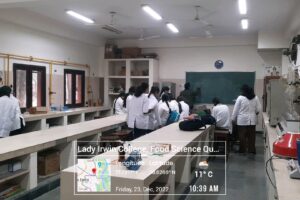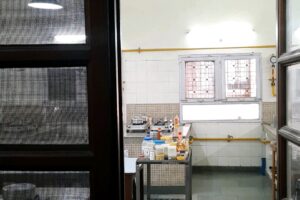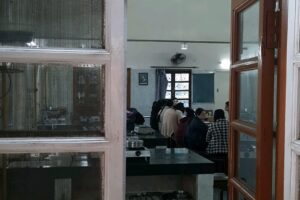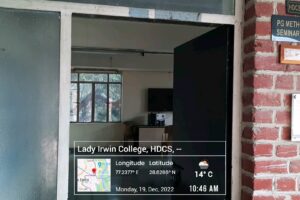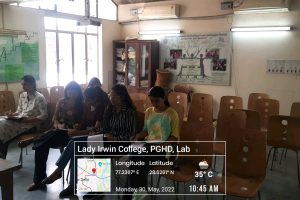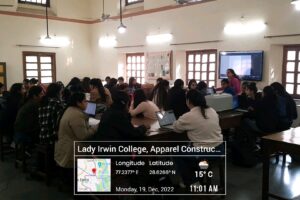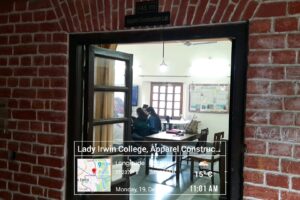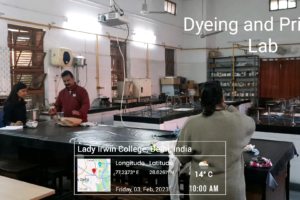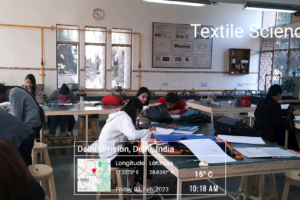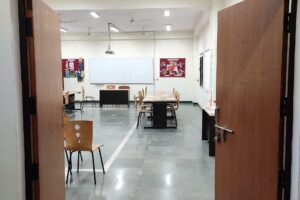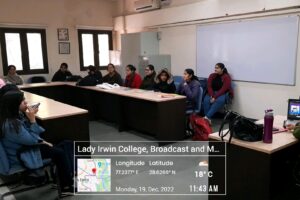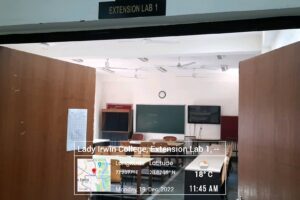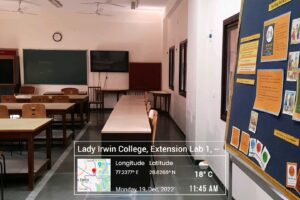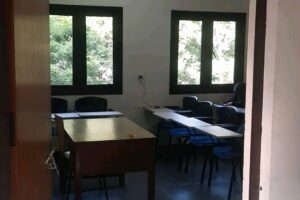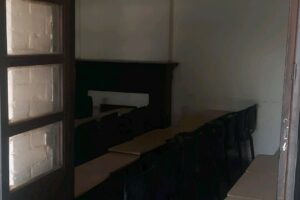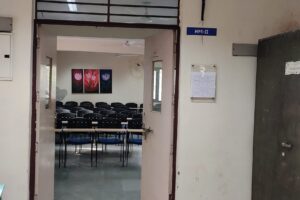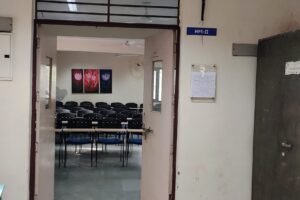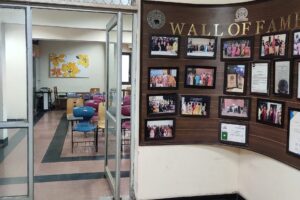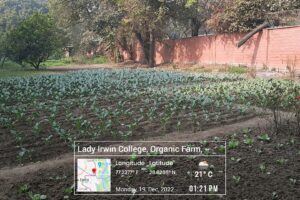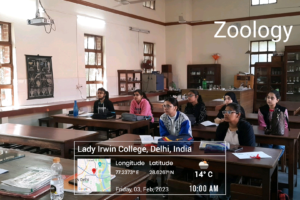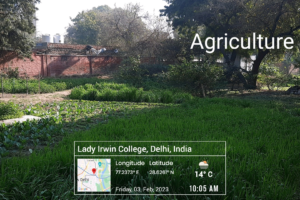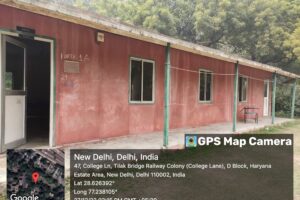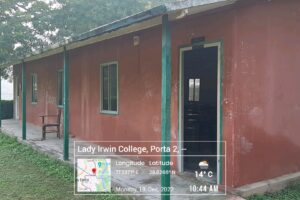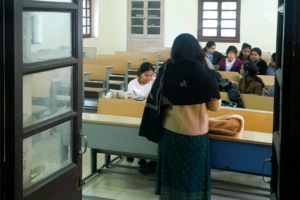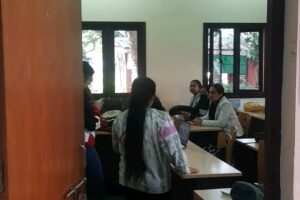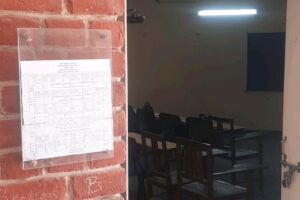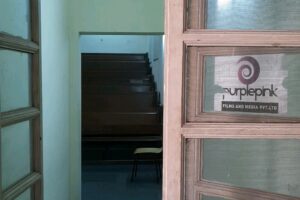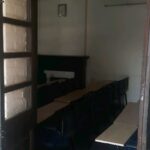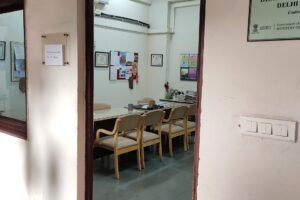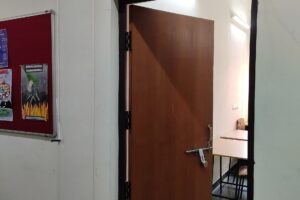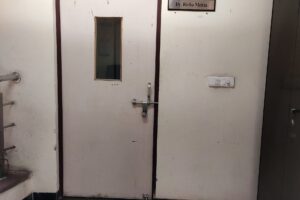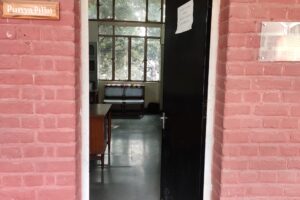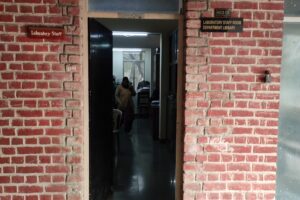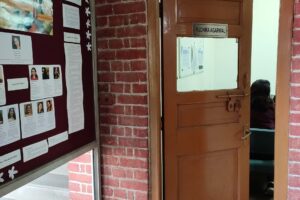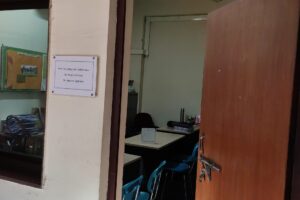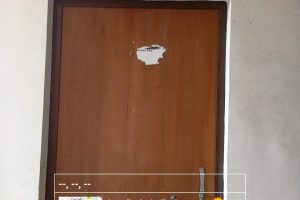About
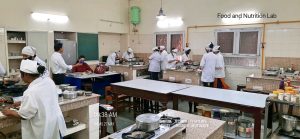
Lady Irwin College is spread over 16.5 acres with red brick buildings amidst sprawling lawns and trees in Lutyens Delhi. Built in 1932 by Sir Walter George a large part of the college is housed in heritage structures. It is well connected with Metro Station (Mandi House) and is a cultural hub being next to Pragati Maidan, Sri Ram Center, Kamani Auditorium, FICCI, India Gate, Connaught Place and the Walled City of Delhi.
The college has well equipped laboratories and classrooms and library with more 57,000 books and bound periodicals. The administrative block has sufficient number and spacious rooms.
Classrooms
Classrooms of different capacities meet requirements of UG, PG and Ph.D. students. Big classrooms are available for 80-100 UG students. For optional courses and DSE (Hons.), class size is about 20 students. Each classroom is equipped with appropriate, comfortable furniture; good ventilation and adequate light. Most classrooms are equipped with LCD projectors and Wi-Fi. Most departments have a seminar room.
| Name | Classrooms | ||
|---|---|---|---|
| UG Teaching | |||
| Main Classrooms | Total No. | ||
| (I DR, II DR, I HCR, II HCR, CR I, CR II, B.Ed., Porta I A, Porta II A, Food Technology, Porta I B, Porta II B, Tutorial rooms) | 10 | ||
| PG Classrooms 27 |
|||
| F & N | 8 | ||
| HDCS | 4 | ||
| RMDA | 4 | ||
| DCE | 4 | ||
| FAS | 2 | ||
| B.Ed. (Near Library) | 4 | ||
| Science | 1 | ||
| Total no. of classrooms | 37 | ||
| Total no. of Seminar Rooms | 08 (RMDA, HDCS, DCE, B.Ed., FN, Library, B.Ed., Seth Ram Lal Hall) | ||
Labs
The academic programme of the college is enriched by laboratory experience. To engage students to a variety of practical orientation, self-instructional, learner friendly modes, there are well-equipped hi-tech laboratories. The Computer Resource Centre acts as a nodal centre to support all digital needs of the college. Hands-on experiential learning is provided through the horticultural experimental farm for research and innovation in farming.
| Department-wise Laboratories | Total No. | |||
|---|---|---|---|---|
| (a) Food and Nutrition Department | ||||
| Food & Nutrition Lab | 1 | |||
| Sushma Kashyap Culinary Science Lab | 1 | |||
| Nutritional Biochemistry Lab | 1 | |||
| Saroja Nutrition Studio | 1 | |||
| Food Microbiology and Food Safety Lab | 1 | |||
| Food Processing & Technology Institutional Food Management Lab | 1 | |||
| Food Science and Quality Control Lab | 1 | |||
| Food Product Development Lab | 1 | |||
| Total no. of labs | 8 | |||
| (b) Resource Management & Design Application Dept. (RMDA) | ||||
| Resource Management labs I | 1 | |||
| Resource Management labs II | 1 | |||
| RM Lab III | 1 | |||
| M.Sc. RMDA Lab | 1 | |||
| Total no. of labs | 4 | |||
| C) Human Development and Childhood Studies Dept. | 4 | |||
| M.Sc. HDCS Lab. | 1 | |||
| HDCS Lab (Ground Floor) | 1 | |||
| Total no. of labs | 2 | |||
| (d) Fabric & Apparel Science Dept. | ||||
| Apparel Construction Lab | 1 | |||
| Fashion Design Lab | 1 | |||
| Dyeing & Printing Lab | 1 | |||
| Fabric Science Lab | 1 | |||
| Apparel & Textile Design Lab | 1 | |||
| M.Sc. Studio | 1 | |||
| Total no. of labs |
6 | |||
| (e) Development Communication & Extension Dept. | ||||
| Oral & Visual Communication Lab | 1 | |||
| Communication lab I | 1 | |||
| Communication Ext. lab II | 1 | |||
| Broadcast & New Media Lab | 1 | |||
| Total no. of labs | 4 | |||
| (f) Department of Education | ||||
| Department of Education Resource Room | 1 | |||
| (g) Science Labs | ||||
| Botany Lab (garden) | 1 | |||
| Chemistry Lab | 1 | |||
| Zoology Lab | 1 | |||
| Physics Lab | 1 | |||
| Total no. of labs | 4 | |||
| (h) CRC Labs | ||||
| CRC Labs I | 1 | |||
| CRC Labs II | 1 | |||
| CRC Labs III | 1 | |||
| Total CRC labs | 3 | |||
| Grand Total (Labs in College) | 32 | |||
| Total No. of Laboratories with ICT facility | 16 | |||
| Total No. of Portable Projectors | 4 | |||
- Raj kumari Amrit Kaur (RAK) child study centre is a laboratory to conduct in-depth research on early childhood care and development by the Department of Human Development and Childhood Studies. RAK provides facilities such as observation labs, crèche, after school care, play school, early intervention (speech therapy, occupational therapy), etc.
- The library is housed in a separate building equipped with latest ICT requirements. It is fully automated. It has a large reading room (used for seminars for 100 persons), INTERNET work stations with 40 computers, one INTRANET server, Fibre Optic connectivity, etc.
- Faculty rooms are shared by 2-4 faculty members. These spaces enable effective student-teacher interaction on personalized basis. Most faculty rooms are Wi-Fi enabled and provided with appropriate furniture and storage facilities.
- Student and Faculty Support Facilities include the students’ meeting spaces i.e., Ashiana, hostel common room, college lawns and amphi-theatre, where students meet for students’ union meetings, GBM, etc. College bookshop provides stationery items along with textbooks and other recommended books of the curriculum.
Concerted efforts are being taken towards making LIC a green campus for which green building audit has been done which has indicated that the buildings on campus utilize plenty of daylight and natural ventilation for comfort and efficiency of users. There are large numbers of trees and lawns which add to improved quality of air and minimize air pollution on the campus. College has key plants that significantly help in improving quality of air such as Areca Palm, Money plant, Aloe Vera, Dracaena, Rubber plant, baobao tree, etc.


